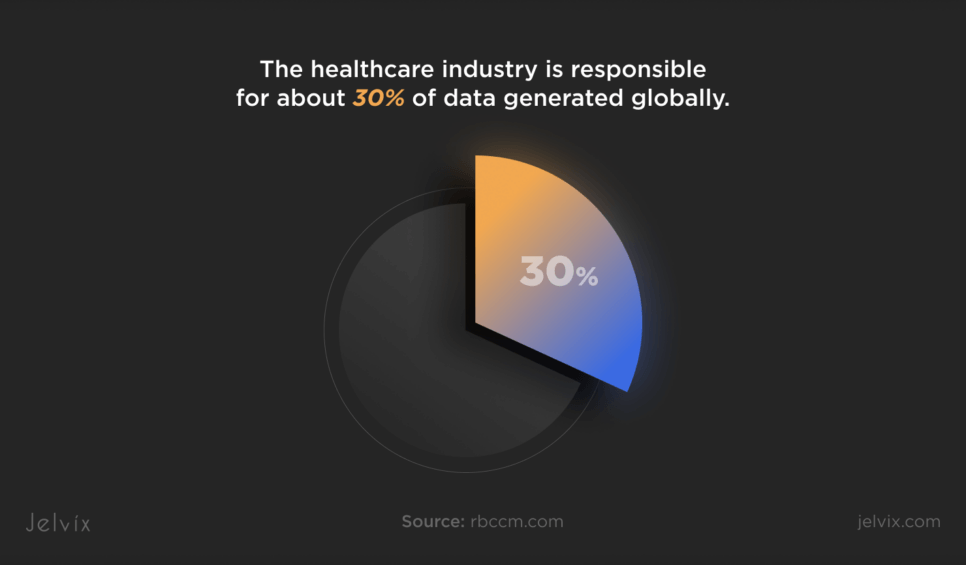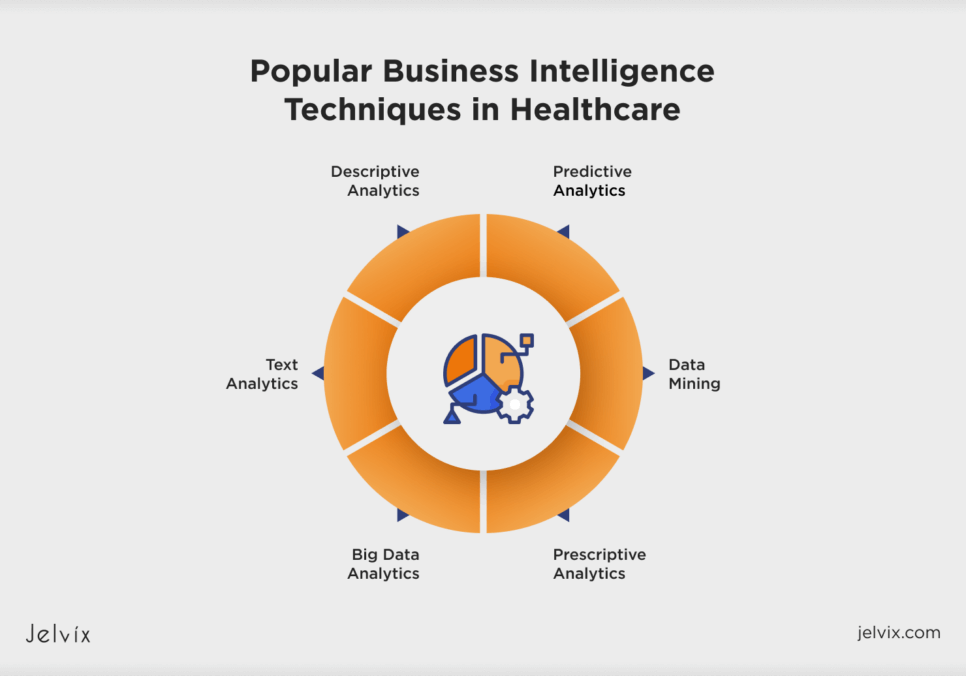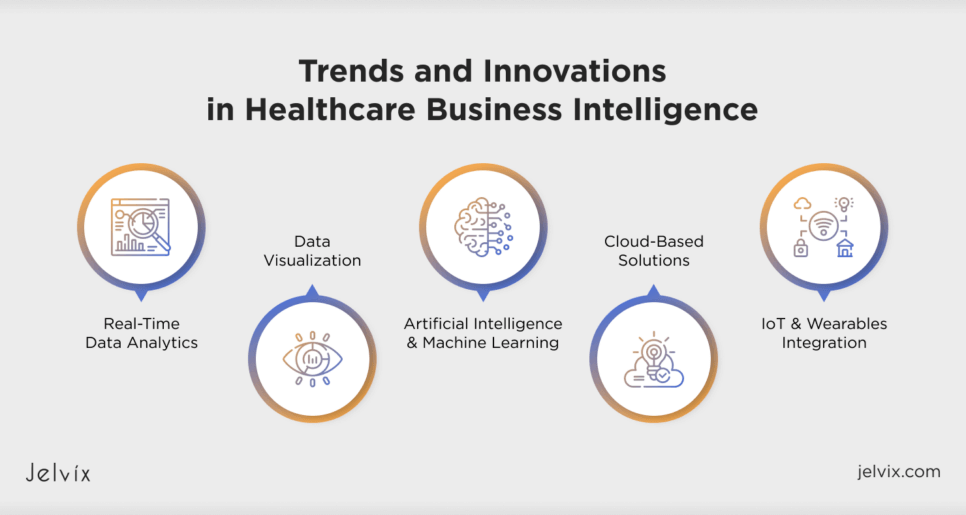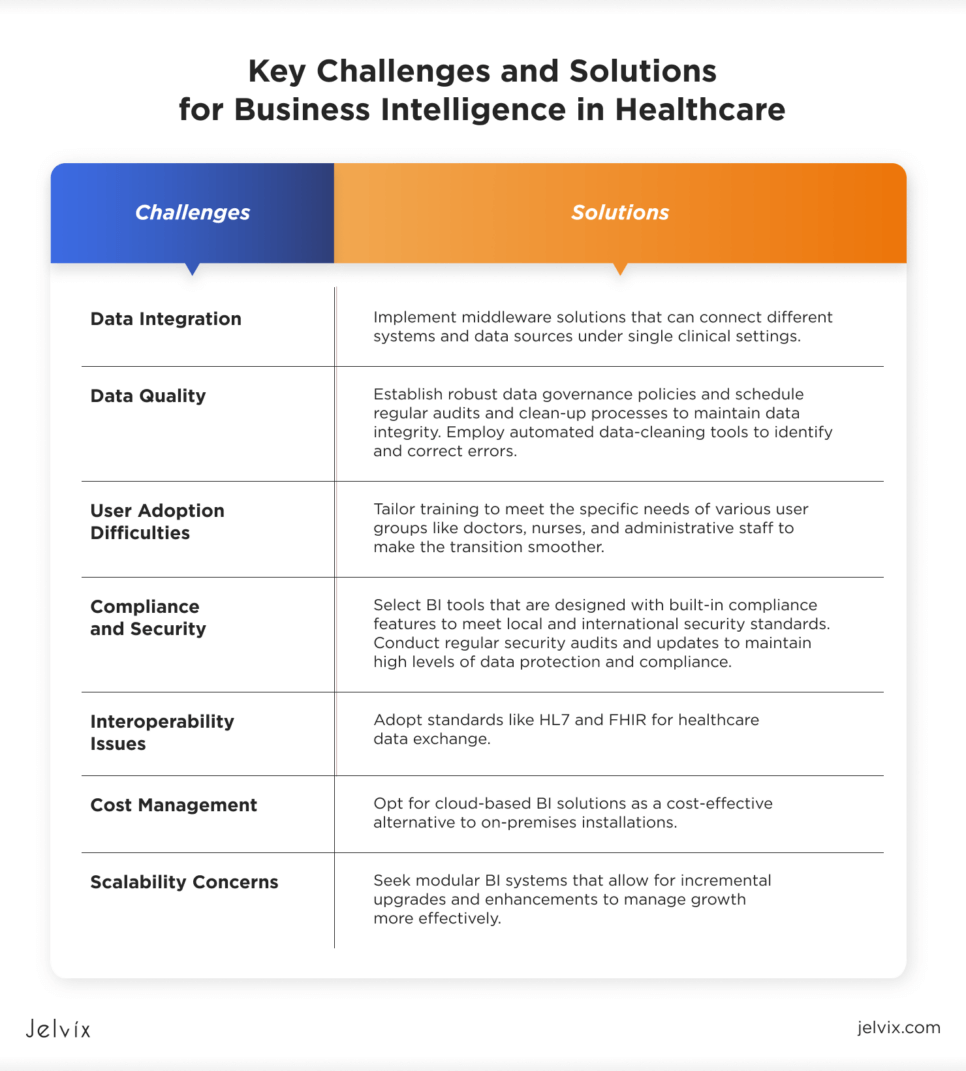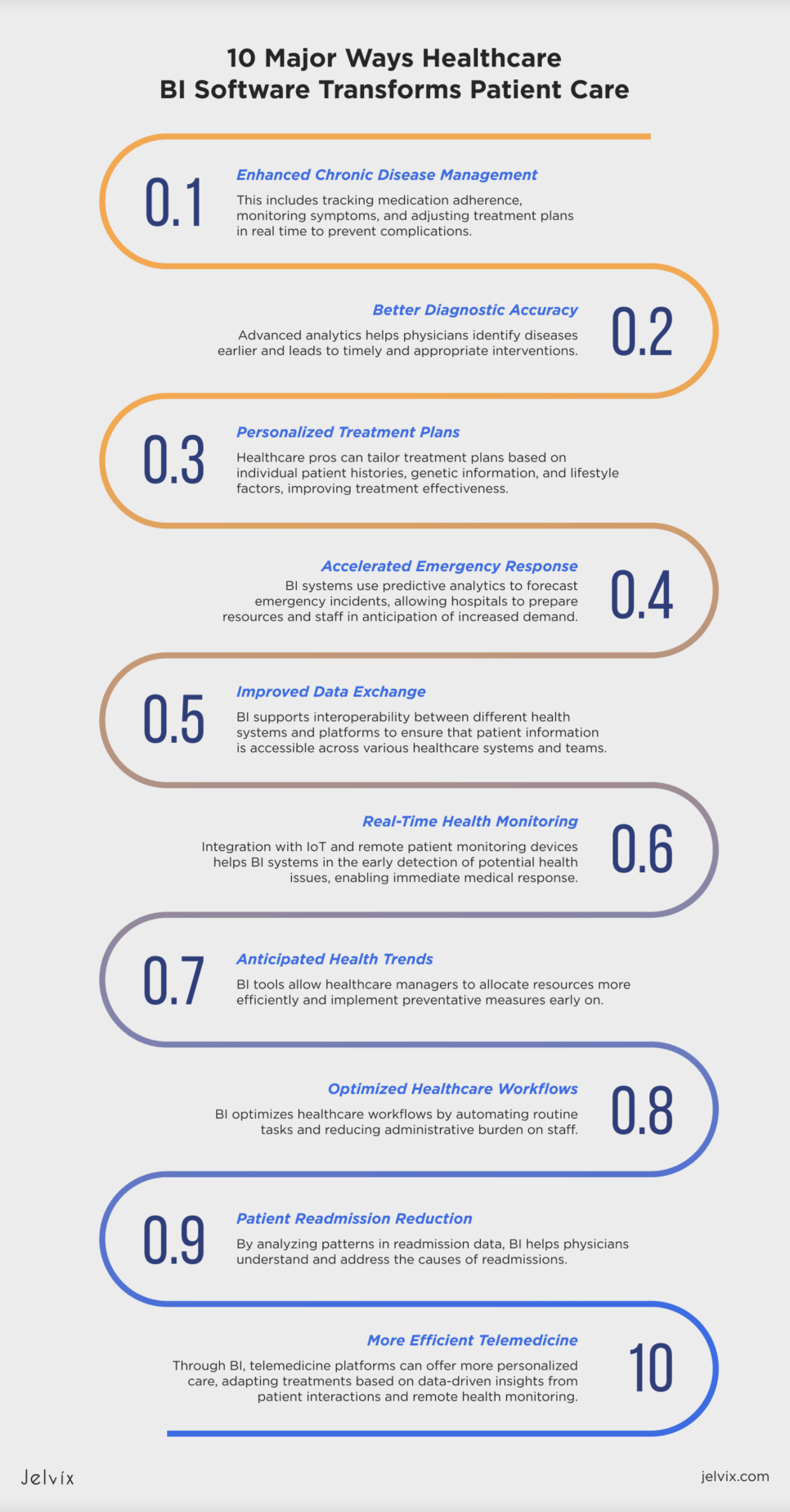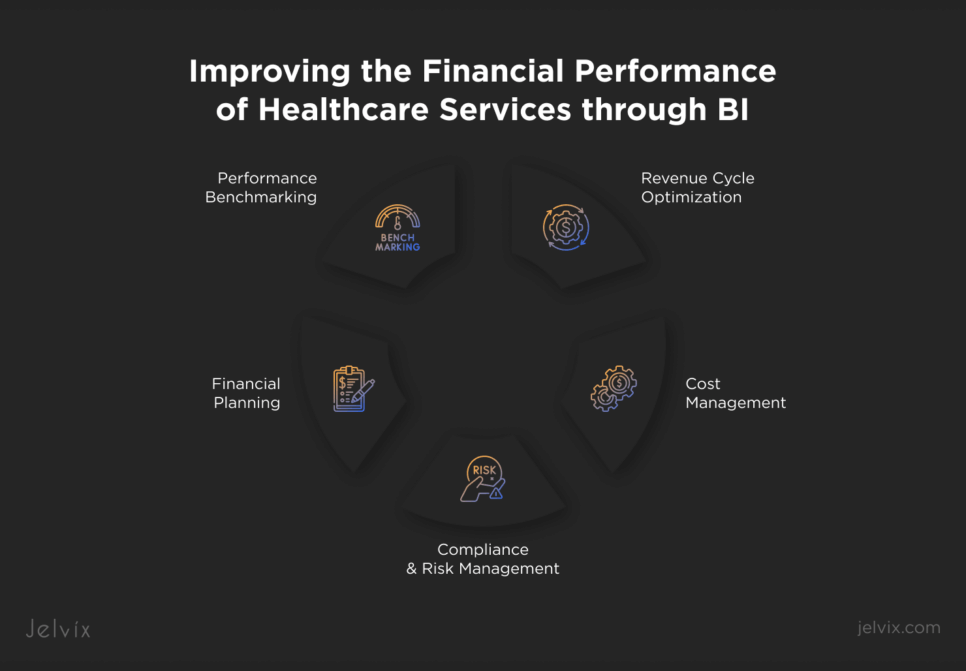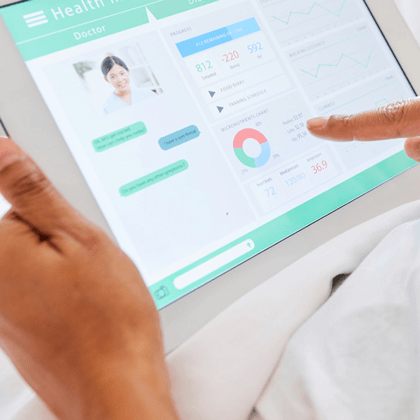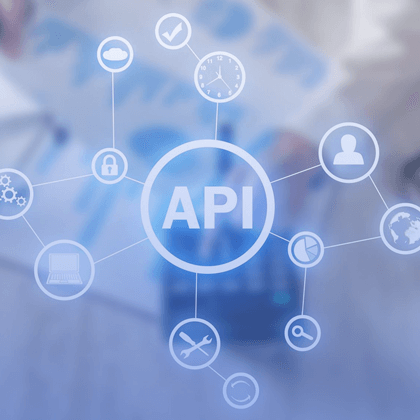According to the research, the healthcare industry is responsible for about 30% of data generated globally. This growing amount of data often makes medical companies struggle to get useful insights about patient conditions and healthcare trends.
That’s why hospitals often opt for business intelligence software that has the potential to get the most out of medical data. However, BI tools bring along challenges like the complexity of integration, scalability problems, concerns over data quality, and staff resistance.
If you want to know how BI tools can improve your clinic’s care delivery, read this article. You’ll learn more about the challenges of integrating BI tools into clinical workflows, ways to overcome them, and how properly integrated BI tools benefit care delivery.
Popular Business Intelligence Techniques in Healthcare
Business intelligence uses several techniques to help healthcare entities make the most of their data, improving everything from patient care to operational efficiency.
Predictive Analytics
Predictive analytics in healthcare uses past data and statistical tools to guess what might happen in the future. For example, hospitals use it to predict patient admissions, helping them manage resources and plan patient care more effectively.
Data Mining
Data mining helps sort through big piles of data to find patterns and relationships. This helps discover new facts about diseases or find out which treatments work best, helping doctors customize care for each patient.
Prescriptive Analytics
Prescriptive analytics helps figure out the best actions to take by predicting future events and suggesting ways to take advantage of or avoid these events. It can suggest different treatment options based on a patient’s history.
Descriptive Analytics
This method uses data to show what happened in the past. Creating easy-to-understand reports and dashboards helps healthcare pros see trends and make decisions based on historical data.
Text Analytics
Text analytics pulls useful information from written resources like patient records or doctor’s notes. This is extremely helpful for managing lots of unstructured data and turning it into useful insights.
Big Data Analytics
Big data analytics involves examining large amounts of data quickly to uncover hidden patterns and insights. This is important for making fast and informed decisions that help improve patient care.
Explore various types of data analytics and unlock insights to drive your business forward.
Trends and Innovations in Healthcare Business Intelligence
At the moment, BI in healthcare is on the rise. Experts predict its market will hit USD 20.37 bln by 2030, compared to USD 7.27 bln in 2022. The need for improved care outcomes and the development of advanced tech are the primary drivers of this growth.
Artificial Intelligence and Machine Learning
Medical companies use AI and ML more frequently in their practice because of their capabilities to analyze broad datasets. Thanks to this tech, healthcare facilities can predict patient expectations and manage clinical resources effectively.
Real-Time Data Analytics
Real-time data analytics is what helps hospitals monitor patient conditions more precisely and respond to emergencies without delays. BI tools that support real-time analytics offer physicians the possibility to make immediate clinical decisions without sacrificing their accuracy.
Data Visualization
Thanks to advanced data visualization offered by BI tools, doctors can understand complex datasets at a glance. Real-time data streams and interactive dashboards help them speed up the decision-making process and enhance operational efficiency across their entity.
Cloud-Based Solutions
Companies that seek scalability and cost-effectiveness often give preference to cloud-based BI solutions. They make it possible to facilitate data sharing and improve collaboration across different healthcare teams, enhancing the continuity of care.
IoT and Wearables Integration
Wearables and IoT devices greatly contribute to remote patient monitoring. When integrated with BI tools, they allow for continuous monitoring of patient health metrics and behaviors. This is especially beneficial for monitoring chronic conditions that require constant attention of medical professionals.
Key Challenges and Solutions for Business Intelligence in Healthcare
BI solutions have the potential to bring numerous benefits to medical entities. But similar to other healthcare tech, they come with a number of challenges that clinics need to address to use the power of these tools extensively.
Data Integration
Because medical companies often deal with a variety of data types and sources, such as EHRs, billing systems, and feedback surveys, the integration of BI tools can be complicated. The Jelvix team recommends implementing middleware solutions that can connect different systems and data sources under single clinical settings. These tools ease the extraction, transformation, and loading (ETL) processes, ensuring uniform formatting and easy access to important data.
Explore the benefits, challenges, and best practices of the ETL process in healthcare for better data management and patient outcomes.
Data Quality
To make the most out of BI analysis, hospitals need to have all medical data clean and accurate. Duplicate records, outdated information, and errors caused by incorrect data entry in healthcare can twist insights and lead to potentially dangerous care decisions. Think about establishing robust data governance policies and schedule regular audits and clean-up processes to maintain data integrity. You can also employ automated data-cleaning tools to identify and correct errors.
User Adoption Difficulties
The effectiveness of BI solutions can be compromised if staff starts resisting the change feeling a lack of understanding or skepticism about the new tools. Comprehensive training programs and clear communication about the benefits of BI tools can aid in boosting user adoption. Tailoring training to meet the specific needs of various user groups like doctors, nurses, and administrative staff can help make the transition smoother.
Compliance and Security
Ensuring BI tools comply with healthcare regulations, such as HIPAA and GDPR, can present ongoing challenges. Select BI tools that are designed with built-in compliance features to meet local and international security standards. Conduct regular security audits and updates to maintain high levels of data protection and compliance.
Interoperability Issues
Healthcare data is often siloed within different departments and systems, making clinical interoperability a significant challenge. To overcome this, adopt standards like HL7 and FHIR for healthcare data exchange. These standards help ensure that different systems communicate and exchange data effectively and securely.
Cost Management
The cost of implementing and maintaining BI systems can be pretty high, especially for smaller healthcare businesses. Opt for cloud-based BI solutions as a cost-effective alternative to on-premises installations. They usually offer better scalability, lower upfront costs, and reduced need for in-house IT maintenance.
Scalability Concerns
As healthcare facilities grow, their data analysis needs change, requiring BI systems to scale accordingly. Make sure to plan for scalability from the very beginning. Seek modular BI systems that allow for incremental upgrades and enhancements to manage growth more effectively.
How Healthcare BI Software Transforms Patient Care: 10 Major Ways
BI tools in healthcare have the power to not just enhance operational processes, but also improve patient care. One of the interesting examples is how the London Health Sciences Centre used BI to improve infection control. The Center collaborated with Microsoft SQL Server 2008 R2 and created a business intelligence solution to use data more efficiently and predict healthcare trends, supporting informed decision-making.
Overall, there are at least ten ways how BI can help your clinic make patient care smarter, faster, and more personal.
1. Enhanced Chronic Disease Management
BI tools analyze trends and patterns in patient data, helping healthcare teams manage chronic diseases more effectively. This includes tracking medication adherence, monitoring symptoms, and adjusting treatment plans in real time to prevent complications.
2. Better Diagnostic Accuracy
Advanced analytics improves diagnostic accuracy by correlating patient data with historical health records and global medical research. It helps physicians identify diseases earlier and leads to timely and appropriate interventions.
3. Personalized Treatment Plans
By using patient data and analytics, BI enables personalized medicine. Healthcare pros can tailor treatment plans based on individual patient histories, genetic information, and lifestyle factors, improving treatment effectiveness.
4. Accelerated Emergency Response
BI systems use predictive analytics to forecast emergency incidents, allowing hospitals to prepare resources and staff in anticipation of increased demand. This rapid response capability significantly enhances patient outcomes in critical situations.
5. Improved Data Exchange
BI supports interoperability between different health systems and platforms, facilitating seamless data exchange. This ensures that patient information is accessible across various healthcare systems and teams, which supports the continuity and coordination of care.
6. Real-Time Health Monitoring
Integration with IoT and remote patient monitoring devices allows BI systems to monitor patient health metrics in real time. This constant monitoring helps in the early detection of potential health issues, enabling immediate medical response.
7. Anticipated Health Trends
BI tools can use AI and machine learning algorithms to process vast datasets to identify health trends and potential outbreaks before they occur. This proactive approach allows healthcare managers to allocate resources more efficiently and implement preventative measures early on.
8. Optimized Healthcare Workflows
BI optimizes healthcare workflows by automating routine tasks and reducing administrative burden on staff. This optimization leads to more efficient operations, allowing healthcare professionals to spend less time on paperwork and more time on patient care. By providing comprehensive performance metrics, BI also helps identify inefficiencies in workflows, enabling continuous improvement in healthcare delivery.
9. Patient Readmission Reduction
By analyzing patterns in readmission data, BI helps physicians understand and address the causes of readmissions. They can develop targeted interventions to reduce these occurrences, improving patient outcomes and reducing healthcare costs.
10. More Efficient Telemedicine
BI significantly enhances telemedicine by providing real-time data and analytics that support virtual health services. Through BI, telemedicine platforms can offer more personalized care, adapting treatments based on data-driven insights from patient interactions and remote health monitoring.
To sum up, BI tools help clinics reduce costs, improve quality of care, and enhance patient outcomes by using data for better-informed decisions. If you want to evaluate your clinical systems for the possibility of integrating BI tools, reach out to our experts. They will help you decide on which type of BI solutions to choose or provide you with advice on developing a custom solution from scratch.
Improving the Financial Performance of Healthcare Services through BI
BI tools are widely used to support the financial health of healthcare companies. By using data-driven insights, healthcare executives can optimize costs, enhance revenue, and improve the efficiency of service delivery.
Revenue Cycle Optimization
BI assists in tracking and analyzing every stage of the revenue cycle, from patient registration to final billing. Insights derived from BI tools help identify bottlenecks that cause delays in billing processes, optimize claims management, and reduce the occurrence of denied claims.
Cost Management
BI tools enable healthcare executives to analyze detailed cost data across different departments and services. By identifying high-cost areas, clinics can implement targeted cost-reduction strategies without compromising the quality of care. For instance, BI can help pinpoint unnecessary diagnostic tests or procedures that do not contribute to improved patient outcomes, saving costs.
Financial Planning
With BI, healthcare organizations can forecast future financial scenarios based on current data trends. These predictions enable proactive financial planning and can guide investment decisions, such as expanding facilities, adding new services, or upgrading technology.
Performance Benchmarking
BI tools facilitate benchmarking against industry standards or past performance metrics. Such benchmarking helps healthcare entities understand how they stack up against competitors and where they need to improve. Performance metrics, such as cost per patient and revenue per bed, help evaluate the clinic’s financial health and operational efficiency.
Compliance and Risk Management
Financial compliance is often a significant concern for healthcare entities because of the complex regulatory environment. BI helps ensure adherence to regulations by monitoring financial operations and flagging anomalies that could indicate risks of fraud or data breaches. Effective risk management protects clinics from financial losses and penalties for non-compliance.
Transforming Supply Chain Management with BI in Healthcare
One of the biggest challenges that the healthcare industry faces is supply chain management, starting from maintaining the critical balance of medical supplies and ending up with ensuring cost-effective procurement practices. Business intelligence tools have the potential to tackle issues related to supply chain operations by using analytics and monitoring capabilities.
Visibility and Tracking
BI tools provide comprehensive visibility into the supply chain by tracking inventory levels, order statuses, and delivery timelines in real time. This increased transparency helps healthcare facilities avoid overstocking or understocking, which can lead to significant cost savings.
Inventory Management
Through the use of predictive analytics, BI tools can forecast future inventory needs based on historical data, seasonal trends, and consumption rates. This feature allows healthcare pros to proactively manage their inventory, ensuring they have the necessary supplies on hand without resorting to costly last-minute acquisitions.
Procurement Processes
BI tools improve procurement by analyzing supplier performance, product quality, and compliance with contract terms. This analysis helps identify the most reliable and cost-effective suppliers, facilitating procurement decisions. What’s more, BI can automate routine procurement tasks, reducing administrative burden and the likelihood of human errors.
Cost Reduction and Financial Insight
One of the primary benefits of implementing BI in supply chain management is the significant cost reduction. By providing detailed insights into all aspects of the supply chain finances, BI tools help healthcare organizations identify wasteful expenditures and opportunities for cost savings.
Integration with Other Systems
BI tools can be integrated with other healthcare management systems such as EHRs and hospital information systems. This integration provides a holistic view of clinical and supply chain needs, improving coordination and operational efficiency.
The Future of Hospital Business Intelligence
The future of healthcare BI is seen to be more interconnected and intelligent. We can expect a stronger focus on predictive analytics, wider capabilities for telemedicine, and automation enhanced by AI.
Domination of Predictive Analytics
The future will see a shift from descriptive analytics to predictive and prescriptive analytics, where BI tools will not only predict future health trends but also prescribe preventative measures and treatments.
Greater Personalization of Care
As BI tools become more sophisticated, there will be a greater emphasis on creating personalized patient experiences and treatment plans. The data-driven insights will assist in tailoring healthcare to individual patient needs.
Expansion of Telemedicine
BI will play an important role in the expansion of telemedicine, providing the backend analytics necessary to support virtual healthcare services effectively. This will include optimizations in resource allocation, patient scheduling, and management of virtual care.
AI-Driven Automation
The integration of AI with BI tools will lead to greater automation in data processing and analysis, reducing the workload on healthcare professionals and lowering the chance of medical errors.
Advanced Genomic Analysis
As genomic data becomes more accessible, BI tools will increasingly be used to analyze this data in conjunction with traditional medical data. This integration will advance personalized medicine, especially in areas like oncology and pharmacogenomics.
The role of BI in healthcare is expanding beyond traditional data reporting. This change promises to provide a more predictive, personalized, and secure approach to data analytics in healthcare. As a result, medical companies can expect better efficiency of their services and significant improvements in patient outcomes.
Developing a Custom BI Solution with Jelvix
If you seek to enhance your healthcare organization’s operational efficiency and decision-making, developing a custom BI solution can be a good idea. At Jelvix, we have vast expertise in tailoring BI tools to meet the specific needs of medical companies and integrating them seamlessly with existing systems.
If you’d like to learn more about the benefits that a custom BI solution can bring to your clinical settings, contact our experts. They will provide you with details about the BI development and integration process tailored to your specific needs.
Looking for a skilled development team?
Achieve your business goals with our dedicated team of experts.


